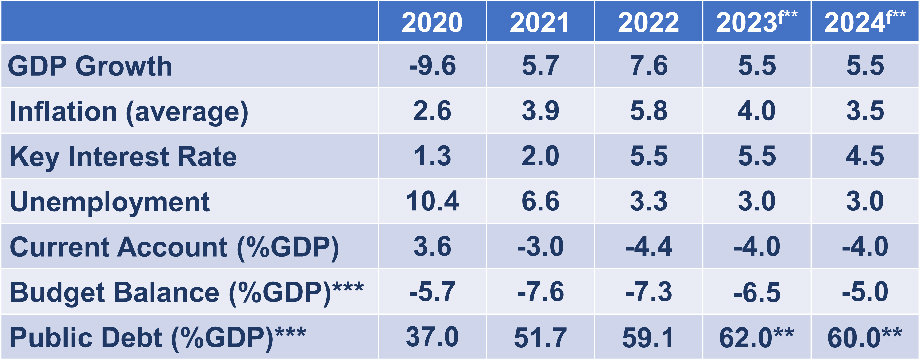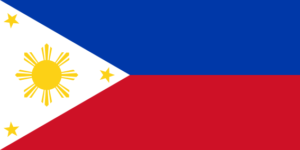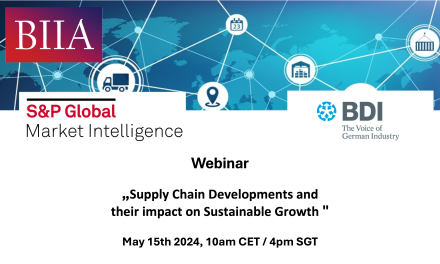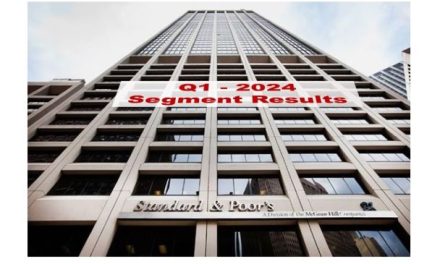Worldbox Business Intelligence Risk Rating – February 2024
PHILIPPINES
Summary
| Overall Risk Score 22 (Stable)
Political risk: Stable 8/10 Economic risk: Stable 7/10 Commercial risk: Stable 7/10 The risk assessment of a country is made up of 3 components, being Political, Economic and Commercial. Each component is scored out of 10 with 1 being the highest risk and 10 the lowest. |
ESG Risk: 7/10 (Stable)*
*Environmental, social and governance (ESG) issues are becoming increasingly important to companies, investors and consumers in Southeast Asia. That is why we are now preparing a separate ESG score and section with our quarterly country risk reports. We explain how each country rates, looking at the E, S and G individually, and outline recent developments. |
Political Risk – Stable at 8
The Philippines Is a multi-party, representative democracy modeled on the US system. This involves a presidential system of government with a bicameral legislature and an independent judiciary. The president is limited to one 6-year term. According to Freedom House:
“Elections are free from overt restrictions. However, established political elites benefit from structural advantages, and highly organized disinformation campaigns and widespread vote buying undermine fair competition. Corruption is endemic, and anticorruption bodies struggle to uphold their mandates. Journalists and activists perceived as critical of the government or other powerful interests can face criminal cases, and in some cases violent and even deadly attack.”
The current president, Ferdinand “Bongbong” Marcos Junior, was elected in a landslide at the May 2022 presidential election. The son of former dictator, Ferdinand Marcos, who ruled the country from 1965 to 1986, Marcos remains popular with an approval rating of 58% in the final quarter of 2023.
There were fears that Marcos’ election would mark a return to the widespread corruption and economic mismanagement that marked the rule of his father in the 1970s and early 1980s. However, the skeptics have been largely confounded. Nikkei Asia reported in December 2023, for example, that:
“The president surrounded himself with a talented cast of technocrats, earned the confidence of the business community, canceled budget-busting infrastructure projects and restored stability to regulatory agencies after six years of chaos under predecessor Rodrigo Duterte. Marcos also acted quickly to mend strained relations with Washington and neighbouring Asian governments. He pledged to restore the trust of human rights watchdogs.”
Bongbong Marcos has also taken a far more robust approach to China’s aggressive claims in the South China Sea than Duarte. In December 2023, Chinese Foreign Minister Wang Yi said that that relations between the two countries are now facing “serious difficulties” following maritime confrontations. Earlier incidents focused on the Second Thomas Shoal have prompted American and Philippine officials to reaffirm a treaty that obliges Washington to come to Manila’s defense in case of an armed attack.
Marcos has pivoted back to the US. Under his administration, the Philippines has strengthened its longstanding defense alliance with Washington, expanding access for American soldiers and holding joint patrols in contested waters.
Economic Risk – Stable at 7
The Philippines is the third largest economy in the Southeast Asian region after Indonesia and Thailand. The economy has been one of the most dynamic in the East Asia and Pacific region, powered by increasing urbanization, a growing middle class, and a large and young population. Services and manufacturing account for around 90% of GDP with the share of agriculture falling steadily to around 10%.
The economy expanded by 7.6% in 2022, the fastest pace since 1976 and above the government’s target of 6.5 to 7.5%. Over the 10 years to 2019, economic growth averaged 6.3% per annum, one of the highest rates in Asia.
The rating agency S&P anticipates that over the next decade the economy will continue to grow rapidly, with total GDP increasing from US$400 billion in 2021 to US$830 billion in 2031. Rapid growth in private consumption spending, buoyed by strong growth in urban household incomes, will be a key driver.
S&P believes that by 2034, the Philippines will become one of the Asia-Pacific region’s one trillion-dollar economies, joining mainland China, Japan, India, South Korea, Australia, Taiwan and Indonesia in this grouping of the largest economies in APAC.
Commercial Risk – Stable at 7
The US State Department’s latest investment climate report on the Philippines, published in August 2022, cites poor infrastructure, high power costs, slow broadband connections, regulatory inconsistencies, and corruption as being the major disincentives to investment. However, it adds that the government is committed to improving the investment climate.
The report adds that:
“While the Philippine bureaucracy can be slow and opaque in its processes, the business environment is notably better within the special economic zones, particularly those available for export businesses operated by the Philippine Economic Zone Authority (PEZA), known for its regulatory transparency, no red-tape policy, and one-stop shop services for investors.”
The Philippines ranks joint 116th out of 180 countries in Transparency International’s 2022 Corruption Perceptions Index—lower than the likes of Thailand, Vietnam and Indonesia. According to the Philippines Corruption Report by GAN, high levels of corruption severely restrict the efficiency of businesses operating in the Philippines.
GAN cites extensive bribery within the public administration and vague and complex laws that make foreign companies vulnerable to extortion and manipulation by public officials. Favouritism and undue influence are widespread in the courts, leading to time-consuming and unfair dispute resolution, and to an uncertain business environment. Corruption plagues the customs administration, and fraud routinely occurs for companies when filing import and export documentation. Moreover, GAN says that the legislative framework for fighting corruption is scattered and is not effectively enforced by the weak and non-cooperative law-enforcement agencies.
The country ranks in 89th place in terms of economic freedom, as ranked by the Heritage Foundation’s 2023 Index, down from 73rd in 2021. The Philippines ranks 18th out of 39 countries in the Asia–Pacific region, and its overall score is approximately the world average.
February Bulletin
Political Risk – Stable at 8
The government and communist rebels announced in November that they intend to resume peace talks in 2024, following a series of failed negotiations by previous administrations. If the negotiations succeed, the rebels will end their 50-year armed struggle and transform into a political movement.
The conflict with the New People’s Army (NPA), the military wing of the Communist Party of the Philippines (CPP) reached its peak in the 1980s and has resulted in the deaths of more than 40,000 people. The announcement of renewed peace talks came shortly after President Marcos granted an amnesty to several rebel groups, including former members of the communist movement.
Overall, the political situation in the Philippines remains stable and the government faces no obvious challenges to its authority.
Economic Risk – Stable at 7
In December 2023, the World Bank forecast the economy would expand by 5.6% this year and 5.8% in 2024. The projection fell below the government’s 6% to 7% growth target for this year. The economy grew 5.9% in the third quarter, beating expectations, fueled by government spending, but is expected to slow in the final quarter.
Inflation has also started to ease significantly, the headline rate dipping to 4.1% in November, its lowest in 20 months and down from 4.9% in October. In November 2022, the figure stood at 8%. Core inflation, excluding volatile items like food and fuel, also eased to 4.7% in November.
The central bank has, however, added a note of caution, warning of high inflation risks including the impact of geopolitical tensions, ranging from China’s aggression in the South China Sea to the war in Ukraine. Also posing a threat are climate factors such as droughts exacerbated by El Nino, a naturally occurring climate phenomenon.
In December 2023, the central bank left its policy rate unchanged at 6.5% for the second consecutive meeting but did not rule out the possibility of further rate hikes. The bank added that it expects inflation to return to within its 2%-4% target range in the first quarter of 2024. WBI believes a further rate hike is unlikely and that the bank will likely pivot to monetary loosening in 2024 as economic growth ebbs.
Also in December, President Marcos signed into law the 2024 budget, which allocates greater funding for defence and maritime security amid the heightened tensions in the disputed South China Sea. The 5.77-trillion peso ($103.5 billion) budget is 9.5% higher than the amount in 2023. Apart from defence spending, the budget prioritizes food security and reduction of logistics costs.
Commercial Risk – Stable at 7
The Philippine financial system continued to perform strongly in the first half of 2023, the central bank reported in November 2023. The bank said the domestic financial system in general and banks in particular showed sustained resilience and stability with a strong balance sheet, profitable operations, sufficient capital and liquidity buffers, and ample provision for probable losses.
The central bank said banks remain well capitalized and highly liquid, with a capital adequacy ratio and key liquidity ratios exceeding the BSP regulatory and international standards.
Environmental, Social and Governance (ESG) – Stable at 7
The United Nations’ Sustainable Development Goals (SDGs) are recognised as a beneficial framework for responsible investment. The Sustainable Development Report from Cambridge University Press assesses the progress of all 193 UN Member States on the SDGs. It provides a useful means of ranking Southeast Asian countries on their ESG progress.
The Philippines is ranked 98 out of 166 in the 2023 report with a score of 67.1.
The Philippines is one of the most heavily deforested areas on the planet, with the majority of land cleared for agricultural purposes and urban construction. Over 10 million hectares of the nation’s forest has been cleared since 1934, and 47,000 hectares of land continues to be deforested every year. In a country dangerously prone to climate change, mass deforestation has only exacerbated the effects, with fewer forests acting as successful carbon sinks and deterrents to droughts and flooding. Several of the nation’s natural disasters have been linked to deforestation, including the 2022 flooding and mudslides in Maguindanao del Norte, resulting in the deaths of 105 people and destruction of 4,100 houses. As a direct result of deforestation numerous animal species have also become extinct or critically endangered, such as the Philippine Eagle, the country’s national bird, and the Tamaraw buffalo. In fact, 700 species are currently endangered including 127 species of bird and 42 land mammal species.
Water pollution is another major environmental issue facing the Philippines, which dumps up to 0.75 million tonnes of plastic into its waterways annually. According to studies by Oxford University, the Philippines contributes a whopping 30% to all plastic found in the world’s oceans, endangering thousands of marine species. In addition to this, a lack of access to clean water kills on average 55 Filipinos a day.
Fortunately, the government appears to be taking steps to reverse the pollution with the Department of Environmental and Natural Resources embarking on a programme for clean water, air and solid waste management. There is also growing awareness among businesses of the impact their activities may have on the environment, society, and the economy, and companies are now expected to take responsibility for their actions in these areas.
Social – According to the US State Department, the Department of Labor’s Bureau of Working Conditions monitors and inspects compliance with wage, hour, and health and safety laws in all sectors, including workers in the formal and informal sectors, and non-traditional labourers. However, labour groups say enforcement is lax particularly in terms of occupational safety and health standards in workplaces.
Governance – The Chandler Institute of Governance’s 2023 Chandler Good Government Index (CGGI) ranked Philippines 66th out of 104 countries. Scores went down in key areas such as leadership, laws and policies, and financial stewardship.
February Bulletin
Environmental, Social and Governance (ESG) – Stable at 7
In March 2023, Sustainable Fitch warned the country’s Securities and Exchange Commission may face challenges in implementing ESG policies because companies tend to highlight only positive aspects of sustainability reports. The Philippines is yet to set out clear details on its ESG and decarbonization strategies, which could hinder the country’s progress compared with other Southeast Asian countries, added Sustainable Fitch.
Latest economic data

f forecasts
* S&P Global
** Worldbox Intelligence
*** Statista
Source: InternationalMonetary Fund, except where stated
Useful links
https://www.transparency.org/en/cpi/2021
https://www.imf.org/en/Countries/PHL
https://www.adb.org/countries/philippines/main
https://business.inquirer.net/
https://mb.com.ph/category/business/business-news/
About Worldbox Business Intelligence
Worldbox Business Intelligence, headquartered in Switzerland, is a Global API data solution provider of business intelligence and used in data analytics.
With the Global API solution Worldbox Business Intelligence enables clients and partners also a frictionless real time onboarding, KYC and compliance verification while rapid global investigations are provided, if needed.
Worldbox Business Intelligence provides global data in a standardised structure to more than 200 Million companies worldwide. The global network of subsidiaries, branches and desks allows to precisely and efficiently collect data and target key territories for clients and partners.”
“Worldbox Business Intelligence – Bringing Swiss Precision To Data”
Copyright (C) 2024 Worldbox Business Intelligence. All rights reserved.
Our mailing address is:
Worldbox Business Intelligence
Breitackerstrasse 1
Zollikon
Zurich 8702
Switzerland





























